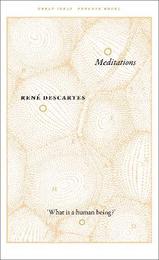
|
Meditations
Paperback / softback
Main Details
| Title |
Meditations
|
| Authors and Contributors |
By (author) Rene Descartes
|
|
Translated by Desmond M. Clarke
|
| Series | Penguin Great Ideas |
|---|
| Physical Properties |
| Format:Paperback / softback | | Pages:144 | | Dimensions(mm): Height 181,Width 111 |
|
| Category/Genre | Philosophy - metaphysics and ontology |
|---|
| ISBN/Barcode |
9780141192963
|
| Classifications | Dewey:194 |
|---|
| Audience | |
|---|
|
Publishing Details |
| Publisher |
Penguin Books Ltd
|
| Imprint |
Penguin Classics
|
| Publication Date |
26 August 2010 |
| Publication Country |
United Kingdom
|
Description
Widely regarded as the father of modern Western philosophy, Descartes sought to look beyond established ideas and create a thought system based on reason. In this profound work he meditates on doubt, the human soul, God, truth and the nature of existence itself. Throughout history, some books have changed the world. They have transformed the way we see ourselves - and each other. They have inspired debate, dissent, war and revolution. They have enlightened, outraged, provoked and comforted. They have enriched lives - and destroyed them. Now Penguin brings you the works of the great thinkers, pioneers, radicals and visionaries whose ideas shook civilization and helped make us who we are.
Author Biography
Rene Descartes was born in 1596 at La Haye (now called Descartes) near Tours, and educated at the Jesuit College at La Fleche. Like many of his contemporaries he contested the value of an education based on Aristotelianism and, after leaving college, attempted to resolve the sceptical crisis of his age by devising a method of reasoning modelled on the rigour and certainty of mathematics. Despite claiming to avoid theological questions and stay within the scope of human reason, his writings involved him in numerous disputes with theologians of both the Catholic and (especially) the Reformed persuasion. In 1621, after a period spent in the Netherlands, Bohemia and Hungary as a soldier, he left the army and devoted himself to the study of science and philosophy. He retired to the Netherlands in 1628 and spent the next twenty years there, living and working in seclusion. Then in late 1649, after an invitation the previous year, he went to Sweden to take up a post instructing Queen Christina in philosophy. Descartes' habit for many years was to rise not much before midmorning but the Queen wished to be tutored at five o'clock in the morning, three days a week. This and the cold weather placed a severe strain on Descartes' health and he contracted pneumonia, dying in Stockholm in early 1650, having only just begun to teach the Queen. His last words were r
|